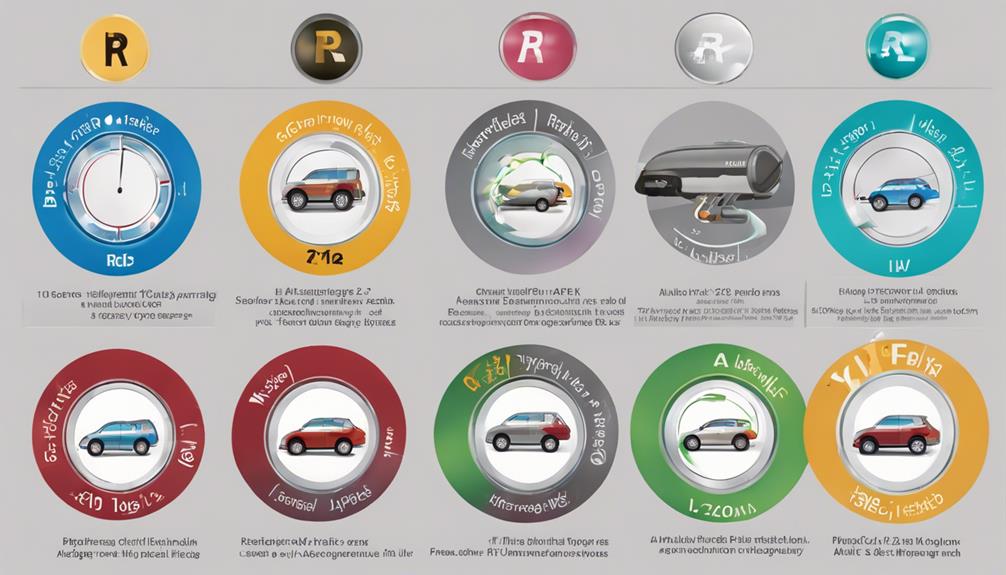Selecting the Right Car AC Refrigerant: A Guide
Did you know that using the wrong car AC refrigerant can lead to a 20% decrease in system efficiency? Ensuring you select the appropriate refrigerant for your vehicle is crucial for optimal performance and longevity.
By understanding the key factors involved in this decision-making process, you can make informed choices that benefit both your car and the environment. Making the right selection not only enhances cooling effectiveness but also contributes to overall sustainability.
So, how can you navigate the maze of car AC refrigerants to find the ideal match for your vehicle's needs and the planet's well-being?
Key Takeaways
- Choose the correct refrigerant for optimal cooling performance and system longevity.
- Avoid efficiency loss, damage, and safety risks by selecting the right refrigerant.
- Consider manufacturer recommendations, cost efficiency, and environmental impact for the best choice.
- Evaluate R-134a, R-1234yf, and R-744 for affordability, energy efficiency, and environmental friendliness.
Importance of Choosing the Right Refrigerant
Selecting the correct refrigerant for your car's AC system is crucial to ensure optimal cooling performance and prevent potential efficiency loss or system damage. When you choose the right refrigerant, you unlock efficiency benefits that not only keep you cool on the road but also help your AC system operate at its best. Using the appropriate refrigerant enhances the overall safety of your vehicle by reducing the risk of malfunctions or breakdowns that could compromise your driving experience.
Safety implications are a significant consideration when it comes to refrigerant selection. Using the wrong refrigerant can lead to system leaks, which may release harmful chemicals into the environment and pose health risks to you and those around you. By selecting the proper refrigerant, you mitigate these safety concerns and ensure that your AC system functions reliably and safely. Opting for the correct refrigerant isn't just about staying cool; it's also about safeguarding your well-being and that of others on the road.
Impact of Incorrect Refrigerant Selection
Choosing an incorrect refrigerant for your car's AC system can have detrimental effects on cooling efficiency, system performance, and overall safety. Here are some key points to consider:
- Reduced Cooling Efficiency: Using the wrong refrigerant can lead to inadequate cooling performance, making your drives uncomfortable during hot weather.
- Damage to AC Components: Incorrect refrigerant selection may cause harm to AC system components, leading to malfunctions and costly repairs.
- Safety Concerns: The wrong refrigerant can pose safety hazards, such as leaks or system failures, jeopardizing both the driver and passengers.
- Costly Repairs: Opting for the incorrect refrigerant can result in expensive repairs and potential system failures, impacting your budget and overall driving experience.
It is crucial to prioritize selecting the right refrigerant to avoid these safety concerns and performance issues, ensuring a well-functioning and safe AC system in your vehicle.
Factors to Consider When Selecting Refrigerant

When deciding on the appropriate refrigerant for your car's AC system, it is essential to thoroughly assess the manufacturer's recommendations and evaluate compatibility with system components. To make an informed decision, consider factors such as cost efficiency and environmental impact. Choosing the right refrigerant can not only ensure optimal performance but also contribute to reducing your carbon footprint.
Below is a table outlining key factors to consider when selecting a refrigerant:
| Factor | Description | Importance |
|---|---|---|
| Manufacturer's Recommendations | Follow guidelines provided by the vehicle manufacturer for optimal performance and compatibility. | High |
| Cost Efficiency | Evaluate the initial cost, long-term expenses, and potential savings associated with the refrigerant. | Medium |
| Environmental Impact | Assess the ecological footprint of the refrigerant, considering its ozone depletion and global warming potential. | High |
Taking into account these factors can help you choose a refrigerant that aligns with your car's AC system requirements while also being cost-effective and environmentally friendly.
Evaluating Popular Car AC Refrigerants
Evaluating popular car AC refrigerants involves analyzing their specific properties and performance characteristics to determine the most suitable option for your vehicle's cooling system. When comparing performance and considering environmental implications, keep the following key points in mind:
- R-134a: Widely used in older vehicles due to its affordability and availability.
- R-1234yf: Known for its lower Global Warming Potential (GWP) and energy efficiency, making it a preferred choice for newer car models.
- R-744 (CO2): A natural refrigerant with minimal environmental impact, suitable for eco-friendly vehicles.
- Compatibility: Consider the compatibility of the refrigerant with your vehicle's AC system components to ensure optimal performance.
Pros and Cons of Refrigerant Types

Transitioning from evaluating popular car AC refrigerants, understanding the pros and cons of different refrigerant types is crucial for making an informed decision based on performance and environmental considerations.
R-134a, known for its affordability and compatibility with older AC systems, does have a downside with its high Global Warming Potential (GWP).
On the other hand, R-1234yf stands out for its lower GWP, increased energy efficiency, and widespread manufacturer approval. However, this refrigerant requires specialized equipment and comes at a slightly higher cost.
Moving towards a more environmentally friendly option, R-744 (CO2) boasts a remarkably low GWP, exceptional cooling performance, and the fact that it's naturally occurring. Despite these advantages, challenges arise due to limited servicing equipment availability and higher upfront costs associated with R-744.
When deciding on a refrigerant type, consider factors like energy efficiency and compatibility with your vehicle's AC system to make the best choice for performance and environmental impact.
Frequently Asked Questions
How Do I Know What Refrigerant My Car Needs?
To determine the refrigerant your car needs, check the label under the hood for R-134a or R-1234yf. If no label, use A/C Pro tools for assistance. Ensuring refrigerant compatibility is crucial for optimal performance and minimizing environmental impact.
How Do I Choose the Right Refrigerant?
To choose the right refrigerant, consider refrigerant compatibility with your AC system and evaluate environmental impact factors like Global Warming Potential. Seek guidance from experts for optimal performance and ensure adherence to manufacturer recommendations.
Which Refrigerant Is Better 134a or 12a?
When deciding between R-134a and R-1234yf, consider the environmental impact. R-1234yf is more eco-friendly due to a lower GWP than R-134a. Performance-wise, R-1234yf is favored by manufacturers for newer car models.
Can I Use 1234yf Instead of 134a?
Yes, you can use R-1234yf instead of R-134a, but ensure compatibility. R-1234yf is eco-friendly with a lower GWP. It's common in newer cars. Professional advice is crucial due to unique servicing needs. Optimal performance requires the right refrigerant.
Conclusion
In conclusion, selecting the right car AC refrigerant is crucial for optimal system performance.
Imagine driving on a hot summer day with your air conditioning blowing cool, refreshing air thanks to the correct refrigerant choice.
By considering factors such as environmental impact, system efficiency, and manufacturer recommendations, you can ensure your vehicle's A/C system operates efficiently and effectively, keeping you comfortable on the road.
Make the right choice for a smooth and cool ride.




![Top-rated Car AC Repair Shop in [City]](https://landroverbar.com/wp-content/uploads/2024/02/highly_rated_car_service-768x439.jpg)


